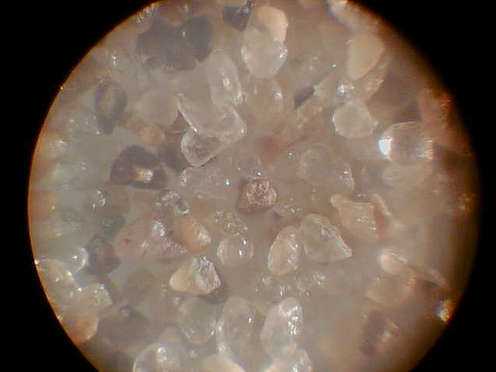FWP:
SETS == DOUBLE ACTIVATION; INEXPRESSIBILITY;
IZAFAT; WORDPLAY
DESERT: {3,1}
JAUHAR: {5,4}
SWORD: {1,3}
ZARRAH: {15,12}
ABOUT MIRAGES: Mirages are not common in Ghalib's imagery, but in the divan, besides the present verse there's {97,12}, and there's also the unpublished {130,5x}. Compare Mir's use of a mirage in M{485,1}.
It's an almost frightening verse-- harsh, eerie, ominous. It sticks in my mind like a thorn. Naiyar Masud's detailed explication is many pages long and well worth reading in full. I have very little to add to it.
The key to the verse, as the commentators have pointed out, is the versatility of āb-dār , with its literal meaning of 'water-possessing' and its actual sense of 'glittering'. Thus in this verse the word āb-dār is 'doubly activated'-- both meanings are fully invoked by the verse (for more such cases, see {120,3}). The āb itself is also echoed in sarāb , 'mirage'. The glitter of a sword or of water; the threat/promise of sword/water (and to the passionate lover a sword may be a promise too). The mirage as a real vision of a false hope; the 'desert of faithfulness' as a lonesome, deadly wasteland. Do mirages actually come in waves? They seem to shimmer on the horizon, perhaps in a wave-like way.
If we really wanted to slice and dice the three iẓāfat constructions in the first line, we could choose among: 'the wave of the mirage (of the desert of faithfulness)'; 'the wave (of the mirage of the desert) of faithfulness'; and '(the wave of the mirage) of the desert of faithfulness'. Each of these readings could be interpreted slightly differently. But the level of abstraction is so high, that the whole process could hardly be very rewarding.
The verse is resonantly full of long ā vowels in general-- emotional-sounding vowels, aren't they?
like the āh of a sigh-- with the next largest group
their short form a .

Nazm:
That is, the way the temper-lines of a sword are āb-dār , in the same way so were the sand-grains of the wave of the mirage. The result is that in the land of passion, swords rain down. (17)
== Nazm page 17